Exclusive: A Bone to Pick with the Lion Bone Industry

On the 21st and 22nd of August last year a parliamentary colloquium was held in Cape Town with the topic of “Captive Breeding For Hunting In South Africa: Harming or Promoting The Conservation Image Of The Country?”, chaired by the Portfolio Committee on Environmental Affairs. The subsequent draft report that was published in November seems to come down firmly on the side of conservation and animal welfare groups who argue that the repugnant canned lion industry is ethically and morally wrong, has no conservation value and should be brought to an end.
All sides were given a fair hearing and the participants ranged from International NGOs, South African animal welfare institutions, scientific bodies, tourist associations and the hunting lobby. Below are the resolutions made by the Committee:
- The Department of Environmental Affairs should, as a matter of urgency, initiate a policy and legislative review of Captive Breeding of Lions for hunting and Lion bone trade with a view to putting an end to this practice and that the Minister of Environmental Affairs should submit quarterly reports to the Portfolio Committee on the progress of this policy and legislative review.
- The Department of Environmental Affairs (DEA) should conduct an audit of captive lion breeding facilities throughout the country…… and should ensure that the current breeding facilities comply with legislation.
- The Department of Environmental Affairs and Department of Agriculture Forestry and Fisheries should present a clear programme of work on how they intend to address animal welfare and health issues that had been raised during the colloquium.
- The Department of Environmental Affairs should reconsider the decision to increase the lion bone trade quota from 800 (2017) to 1500 lion skeletons (2018) – a decision which was purportedly based on the Interim Report of the Scientific Authority. However this report, it emerged during the colloquium, was informed by commercial considerations, as opposed to those of science. This reconsideration is necessary given the huge public sentiment expressed against the increase in lion bone trade quota.
The first tangible victory that has emerged from this colloquium and subsequent resolutions is that the Environmental Affairs Minister, Nomvula Mokonyane, has indeed reduced the number of legal skeletons back to 800, slashing in half the previous quota that was only recently set in June 2018.
There have been amazing strides and there is indeed reason to celebrate, however we feel we need to add some words of caution. Outrage at the practice of captive breeding and hunting was obvious in the room and it is evident that international awareness of the industry has increased over the last few years tainting South Africa’s image both in terms of its reputation for conservation and as a tourist destination. The South African government is not legally obliged to follow the recommendations of the Portfolio committee and it is difficult to imagine that they will spring into action to reverse their own, lucrative policy. The die-hards (in all senses of the term!) are not going to be defeated that easily either. A representative from the South African Predator Association (SAPA) claimed that “the captive lion industry in South Africa is a well-regulated, manageable industry that contributes way more positively to South Africa than negatively”. It’s worth big money to them, possibly over US$70 million a year. He omitted to mention that even Safari Club International (SCI), the world’s largest hunting club has turned its back on South Africa’s canned lion hunting industry, announcing it would no longer allow captive–bred lion operators to advertise or market captive–bred lions at its annual convention, and would reject all captive-bred lion entries for its record books. The representative of the Confederation of Hunters Associations of South Africa (CHASA) made the most remarkable statement of all. He concluded “by affirming that if South Africa was going to stop anything, it should stop the people telling the world about South Africa’s ills. South Africa should show the good news and kill the bad news; that is what Brand South Africa is all about.” I was there when he said this and was totally aghast. In effect he is saying: let’s just stop talking about it and everything in the garden will be rosy.
The serious point however is that these groups are well-organised, influential in political circles and have rich backers. The CEO of the South African Predator Breeders Association is said to be “extremely unhappy and could go to court to overturn a potential ban on the breeding of lions in captivity”, as they did in 2010. We could well see years and years of sloth–like action from the government, legal interventions and court cases.
The report is a step in the right direction. The more it is talked about the better; parliamentary debates may follow and international pressure should be sustained. The very least that will come of it is that animal welfare issues and conditions on the farms were brought to the fore and hopefully the regulations will be tightened up. For far too long now the Department of Environment and the Department of Agriculture have pointed the finger of blame at each other for the abusive practices that take place.
To read the report click here.
